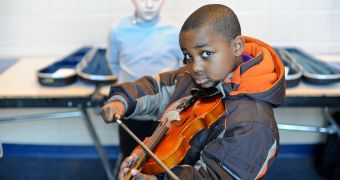Children who play a musical instrument are apparently able to distinguish sounds much better in a noisy environment, and also tend to be better at detecting the subtle changes in the tone of a person they are conversing with. Researchers believe that this increased ability comes from the fact that music can enhance the brainstem's sensitivity to sounds, thus making it easier for the cortex to make out minor variations in the music or words a children playing an instrument hears. Based on the new conclusions, researchers suggest that musical training should remain an important part of basic education, ScienceDaily reports.
According to the Northwestern University Hugh Knowles Professor of Neurobiology, Physiology and Communication Sciences, Nina Kraus, music has the profound effect of shaping the sensory system differently. The findings were presented on February 20, at the annual meeting of the American Association for the Advancement of Science (AAAS), held in San Diego. “Playing an instrument may help youngsters better process speech in noisy classrooms and more accurately interpret the nuances of language that are conveyed by subtle changes in the human voice. Cash-strapped school districts are making a mistake when they cut music from the K-12 curriculum,” Kraus reveals.
“People's hearing systems are fine-tuned by the experiences they've had with sound throughout their lives. Music training is not only beneficial for processing music stimuli. We've found that years of music training may also improve how sounds are processed for language and emotion,” the expert adds. She is also the director of the Northwestern School of Communication Auditory Neuroscience Laboratory. The new investigation is the first ever to offer solid scientific proof as to the fact that playing an instrument helps shape the human brain. The research builds on previous work that showed this to be possible, but failed to produce uncontroversial arguments.
“The neural enhancements seen in individuals with musical training is not just an amplifying or volume knob effect. Individuals with music training show a selective fine-tuning of relevant aspects of auditory signals. Playing music engages the ability to extract relevant patterns, such as the sound of one's own instrument, harmonies and rhythms, from the 'soundscape.' Not surprisingly, musicians' nervous systems are more effective at utilizing the patterns in music and speech alike,” Kraus concludes.

 14 DAY TRIAL //
14 DAY TRIAL //